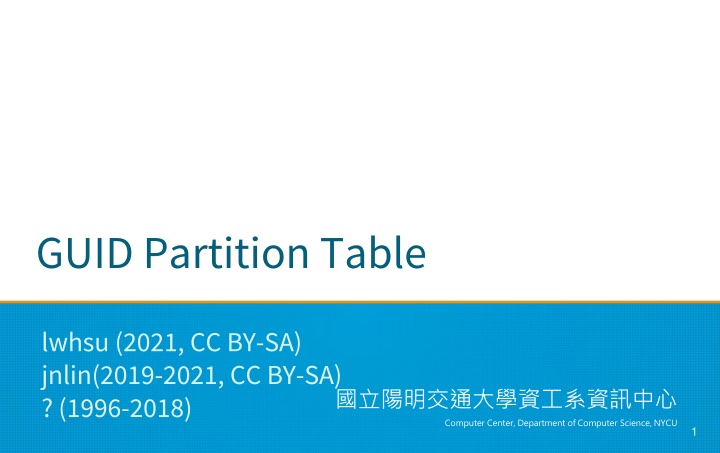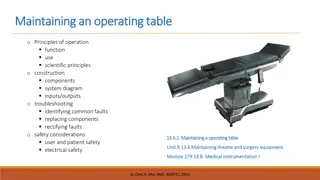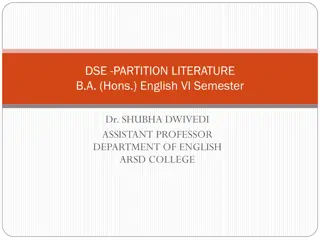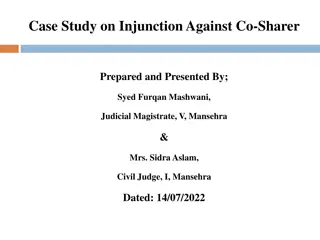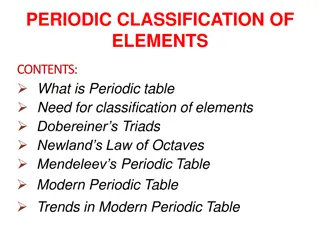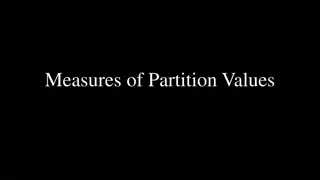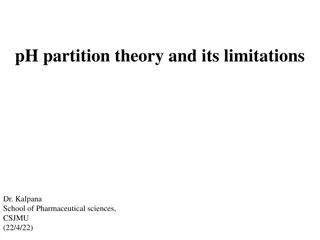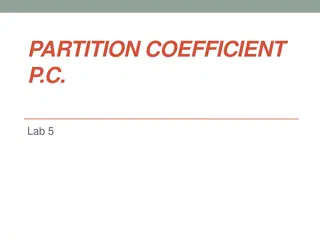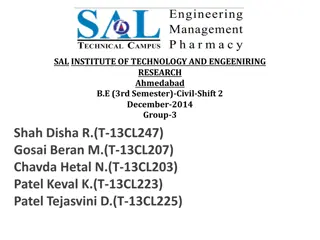GUID Partition Table
GUID Partition Table (GPT) outlines the structure of GPT, contrasting it with Master Boot Record (MBR). The GPT addresses limitations of MBR, such as supporting larger disk sizes and providing a flexible pre-OS environment. Learn about the advantages of GPT, its components, and how it facilitates booting from disks. Explore the differences between GPT and MBR, highlighting GPT's benefits and innovative design.
Download Presentation

Please find below an Image/Link to download the presentation.
The content on the website is provided AS IS for your information and personal use only. It may not be sold, licensed, or shared on other websites without obtaining consent from the author.If you encounter any issues during the download, it is possible that the publisher has removed the file from their server.
You are allowed to download the files provided on this website for personal or commercial use, subject to the condition that they are used lawfully. All files are the property of their respective owners.
The content on the website is provided AS IS for your information and personal use only. It may not be sold, licensed, or shared on other websites without obtaining consent from the author.
E N D
Presentation Transcript
GUID Partition Table lwhsu (2021, CC BY-SA) jnlin(2019-2021, CC BY-SA) ? (1996-2018) Computer Center, Department of Computer Science, NYCU 1
Topics Unified Extensible Firmware Interface (UEFI) Master Boot Record (MBR) GUID Partition Table (GPT) 2
Unified Extensible Firmware Interface Operating System Legacy BIOS limitations 16-bit processor mode 1 MB addressable space Advantages 32-bit/64-bit processor mode Ability to boot from larger disk with a GPT Flexible pre-OS environment, including network capability Modular design Compatibility Support Module (CSM) BIOS-MBR BIOS-GPT Extensible Firmware Interface Firmware Hardware Reference: https://man.freebsd.org/uefi 3
Master Boot Record (1/2) The Master Boot Record (MBR) is the first 512 bytes of a storage device Offset Length Contents 0 446 bytes Boot code area 446 64 bytes Partition tables, each has 16 bytes 510 2 bytes Boot signature (0x55AA) 512 bytes Total size: 446 + 64 + 2 Reference: https://en.wikipedia.org/wiki/Master_boot_record https://wiki.osdev.org/MBR_(x86) 4
Master Boot Record (2/2) Drawbacks (4 primary partitions) or (3 primary + 1 extended partitions) Arbitrary number of logical partitions within the extended partition The logical partition meta-data is stored in a linked-list structure One byte partition type codes which leads to many collisions Maximum addressable size is 2 TiB, i.e. any space beyond 2 TiB cannot be defined as a partition MBR stores partition sector information using 32-bit LBA values 512 bytes per sector 2^32 * 512 bytes = 2 TiB 5
Booting Process 1. System initializing and self testing with the firmware called BIOS 2. BIOS loads the MBR of the boot device to memory (0000:7C00), then point CPU to start execute it (as 1st bootloader). 3. Bootloader reads the partition table and find the next boot program Conventional Windows/DOS MBR bootloader searches for one active and primary partition Different operating systems or boot manager have their own implementations 4. The final member in the boot chain loads the operating system 6
GUID Partition Table (1/9) GUID stands for Globally Unique Identifier Ex: 3F2504E0-4F89-41D3-9A0C-0305E82C3301 Part of the UEFI specification Solves some legacy problems with MBR but also may have compatibility issues Also recognized on a BIOS system via the protective MBR (LBA 0) LBA: Logical Block Address Reference: https://en.wikipedia.org/wiki/Logical_block_addressing https://en.wikipedia.org/wiki/GUID_Partition_Table 7
GUID Partition Table (2/9) Advantages Filesystem-independent No partition type collision because of GUIDs 8 ZiB GPT uses 64-bit LBA 512 bytes per sector 2^64 * 512 bytes = 8 ZiB Backup header and partition table at the end of the disk CRC32 checksums for header and partition table 8
GUID Partition Table (3/9) GPT Scheme LBA 0: Protective MBR LBA 1: GPT header LBA 2~33: Partition entries Up to 128 partitions LBA 34~: Partitions LBA -34~-1: Secondary GPT data Kbolino is the original author of this work. It is based heavily upon an image created by Scorpiuss. 9
GUID Partition Table (4/9) Legacy MBR (LBA 0) A single partition type of 0xEE For OSes cannot read GPT disks: Unknown type, no empty space Refuse to take actions unless further instructions (safety reasons) For GPT-aware OSes: check the protective MBR Check if the enclosed partition type is single 0xEE type If not, refuse to take action 10
GUID Partition Table (5/9) GPT header (LBA 1) Offset Length 8 bytes Signature ("EFI PART", 45 46 49 20 50 41 52 54) Contents 0 8 4 bytes Revision (For GPT version 1.0 (through at least UEFI version 2.3.1), the value is 00 00 01 00) 12 16 20 24 32 40 48 56 72 80 84 88 92 4 bytes Header size in little endian (in bytes, usually 5C 00 00 00 meaning 92 bytes) 4 bytes CRC32 of header (0 to header size), with this field zeroed during calculation 4 bytes Reserved; must be zero 8 bytes Current LBA (location of this header copy) 8 bytes Backup LBA (location of the other header copy) 8 bytes First usable LBA for partitions (primary partition table last LBA + 1) 8 bytes Last usable LBA (secondary partition table first LBA - 1) 16 bytes Disk GUID (also referred as UUID on UNIXes) 8 bytes Partition entries starting LBA (always 2 in primary copy) 4 bytes Number of partition entries 4 bytes Size of a partition entry (usually 128) 4 bytes CRC32 of partition array * Reserved; must be zeroes for the rest of the block (420 bytes for a 512-byte LBA) 11
GUID Partition Table (6/9) GPT header (LBA 1) # dd if=/dev/ada0 bs=512 count=1 skip=1 | hd 1+0 records in 1+0 records out 512 bytes transferred in 0.004644 secs (110259 bytes/sec) 00000000 45 46 49 20 50 41 52 54 00 00 01 00 5c 00 00 00 |EFI PART....\...| 00000010 b4 89 4d 11 00 00 00 00 01 00 00 00 00 00 00 00 |..M.............| 00000020 ff ff ff 01 00 00 00 00 28 00 00 00 00 00 00 00 |........(.......| 00000030 d7 ff ff 01 00 00 00 00 fa 2e 89 f8 d5 c6 ea 11 |................| 00000040 ad c5 08 00 27 9c b4 87 02 00 00 00 00 00 00 00 |....'...........| 00000050 80 00 00 00 80 00 00 00 0f 3e 88 1f 00 00 00 00 |.........>......| 00000060 00 00 00 00 00 00 00 00 00 00 00 00 00 00 00 00 |................| * 00000200 12
GUID Partition Table (7/9) Partition entries (LBA 2) Offset Length 16 bytes Partition type GUID 16 bytes Unique partition GUID 8 bytes First LBA (little-endian) 8 bytes Last LBA (inclusive, usually odd) 8 bytes Attribute flags (e.g. bit 60 denotes read-only) 72 bytes Partition name (36 UTF-16LE code units) 128 bytes Contents 0 16 32 40 48 56 Total 13
GUID Partition Table (8/9) Partition type GUID efi C12A7328-F81F-11D2-BA4B-00A0C93EC93B freebsd-boot 83BD6B9D-7F41-11DC-BE0B-001560B84F0F freebsd-swap 516E7CB5-6ECF-11D6-8FF8-00022D09712B freebsd-ufs 516E7CB6-6ECF-11D6-8FF8-00022D09712B freebsd-zfs 516E7CBA-6ECF-11D6-8FF8-00022D09712B Reference: gpart(8) https://man.freebsd.org/gpart/8 14
GUID Partition Table (9/9) Partition entries (LBA 2) # dd if=/dev/ada0 bs=512 count=1 skip=2 | hd 1+0 records in 1+0 records out 512 bytes transferred in 0.000425 secs (1205747 bytes/sec) 00000000 9d 6b bd 83 41 7f dc 11 be 0b 00 15 60 b8 4f 0f |.k..A.......`.O.| 00000010 d1 0e 8a f8 d5 c6 ea 11 ad c5 08 00 27 9c b4 87 |............'...| 00000020 28 00 00 00 00 00 00 00 27 04 00 00 00 00 00 00 |(.......'.......| 00000030 00 00 00 00 00 00 00 00 67 00 70 00 74 00 62 00 |........g.p.t.b.| 00000040 6f 00 6f 00 74 00 30 00 00 00 00 00 00 00 00 00 |o.o.t.0.........| 00000050 00 00 00 00 00 00 00 00 00 00 00 00 00 00 00 00 |................| * 00000080 b5 7c 6e 51 cf 6e d6 11 8f f8 00 02 2d 09 71 2b |.|nQ.n......-.q+| 00000090 f8 60 8f f8 d5 c6 ea 11 ad c5 08 00 27 9c b4 87 |.`..........'...| 000000a0 28 04 00 00 00 00 00 00 27 04 40 00 00 00 00 00 |(.......'.@.....| 000000b0 00 00 00 00 00 00 00 00 73 00 77 00 61 00 70 00 |........s.w.a.p.| 000000c0 30 00 00 00 00 00 00 00 00 00 00 00 00 00 00 00 |0...............| 000000d0 00 00 00 00 00 00 00 00 00 00 00 00 00 00 00 00 |................| * 00000100 ba 7c 6e 51 cf 6e d6 11 8f f8 00 02 2d 09 71 2b |.|nQ.n......-.q+| 00000110 ca 38 94 f8 d5 c6 ea 11 ad c5 08 00 27 9c b4 87 |.8..........'...| 00000120 28 04 40 00 00 00 00 00 d7 ff ff 01 00 00 00 00 |(.@.............| 00000130 00 00 00 00 00 00 00 00 7a 00 66 00 73 00 30 00 |........z.f.s.0.| 00000140 00 00 00 00 00 00 00 00 00 00 00 00 00 00 00 00 |................| * 00000200 freebsd-boot freebsd-swap freebsd-zfs 15
gpart(8) $ ls /dev/nvd0* /dev/nvd0 /dev/nvd0p1 /dev/nvd0p2 /dev/nvd0p3 $ gpart show => 40 976773088 nvd0 GPT (466G) 40 532480 1 efi 532520 2008 - free - 534528 4194304 2 freebsd-swap (2.0G) 4728832 972044288 3 freebsd-zfs 976773120 8 - free - (260M) (1.0M) (464G) (4.0K) 16
